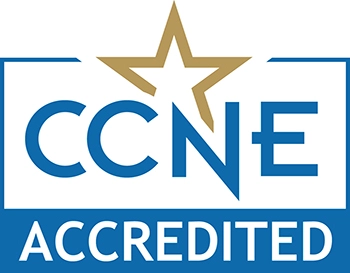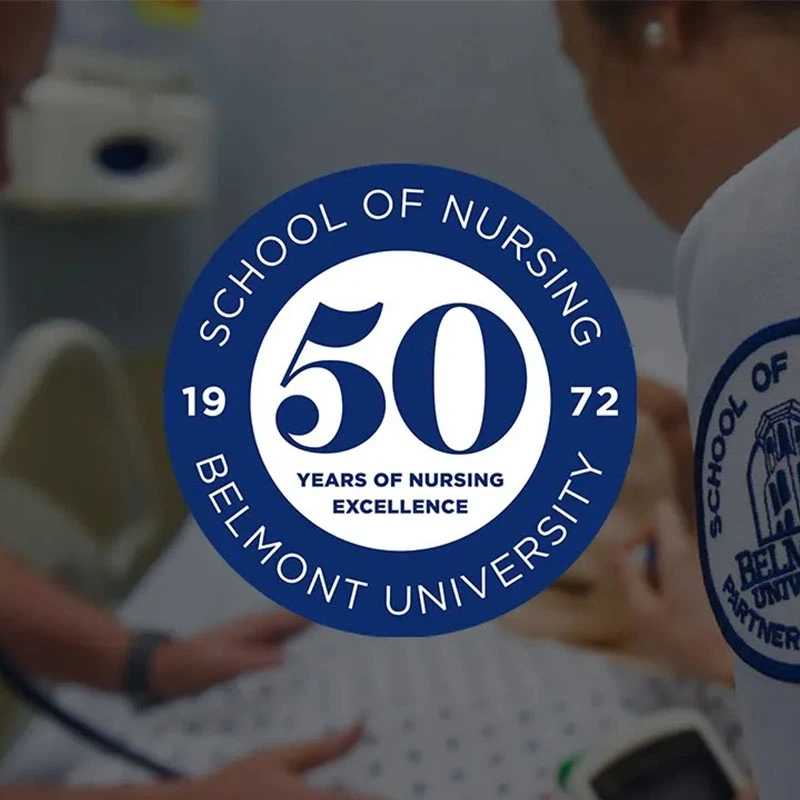Why Choose Belmont's Doctor of Nursing Practice?
Belmont University's Doctor of Nursing Practice (DNP) program stands out for its unique blend of flexibility, interdisciplinary collaboration, global health care engagement and a strong emphasis on innovation. Here's why it’s an exceptional choice:
Flexible Online Learning with Immersive Experiences
Belmont’s DNP program is designed for working professionals, offering asynchronous online courses complemented by up to three in-person immersion experiences per year. This model allows students to advance their education without pausing their careers, maintaining a balance between work and study while benefiting from hands-on, in-person training.
100% Clinical Placement
Belmont boasts a 100% clinical placement rate, ensuring students gain vital hands-on experience in diverse health care settings, removing the stress of securing placements on their own. The Inman College of Nursing has strong partnerships with health agencies both locally and globally.

Prime Location in the Health Care Capital
Nashville, while famous for its music industry, actually generates more revenue from health care. This unique environment offers Belmont's DNP students exceptional access to major health care systems and industry leaders. The program’s strong partnerships with organizations like HCA Healthcare’s Department of Care Transformation & Innovation and the Tennessee Department of Health offer students real-world insights and networking opportunities in a thriving health care hub.
What You'll Learn
![]() Belmont University’s DNP program prepares nurses for advanced practice as clinicians and scholars dedicated to improving population health. Students graduate skilled in the measurement of outcomes, education of diverse populations, leadership in health policy development and implementation, translation of evidence into clinical practice, and advocacy for safe and quality care within complex health care delivery systems.
Belmont University’s DNP program prepares nurses for advanced practice as clinicians and scholars dedicated to improving population health. Students graduate skilled in the measurement of outcomes, education of diverse populations, leadership in health policy development and implementation, translation of evidence into clinical practice, and advocacy for safe and quality care within complex health care delivery systems.
Additional Program Details
Courses You'll Take
The Belmont University Graduate Program Course Catalogs outline study plans and course descriptions. Click the link below to download a sample plan of study.
Downloadable Programs of Study
Family Nurse Practitioner Track Program of Study
Supportive Faculty and Competency-Based Curriculum
Belmont’s DNP faculty prioritizes individualized attention, fostering strong relationships with students and providing tailored support throughout the program. The competency-based curriculum ensures students graduate with the skills, confidence and leadership abilities necessary to excel in advanced practice nursing roles.
Rich University Ecosystem
Belmont University’s DNP draws on a diverse and resource-rich ecosystem that includes the Center for Nursing Innovation, the Massey College of Business, the O’More College of Architecture & Design, the College of Pharmacy & Health Sciences and the Thomas F. Frist, Jr. College of Medicine. This interdisciplinary approach ensures that DNP students are exposed to a broad array of perspectives and opportunities for collaboration, equipping them to address the complex challenges of today’s health care environment.
Innovation & Leadership
A distinctly forward-thinking curriculum, combined with the resources of the Center for Nursing Innovation, positions students to lead the transformation of health care. Whether it's reimagining health care environments or developing new care delivery models, Belmont empowers its DNP students to become trailblazers in health care innovation. Choosing Belmont’s DNP program means joining a collaborative, innovative and forward-thinking community that prepares you for leadership in health care on both local and global stages.
The Belmont DNP meets the core competencies for advanced-level nursing practice (“The Essentials”) developed by the American Association of Colleges of Nursing (AACN).
Graduates of Belmont's graduate nursing programs will be able to:
- Employ advanced clinical judgment to manage complex health conditions across diverse populations, incorporating evidence-based practices to improve care outcomes.
- Inspire interdisciplinary collaboration, enhance care, and drive meaningful change through advanced communication strategies.
- Lead initiatives that promote compassionate, person-centered care, addressing not only clinical needs but also the emotional, spiritual, and social aspects of health and well-being.
- Integrate concepts of hope, unity, and belonging into clinical practice, education, and leadership roles, promoting life abundant for all people.
- Apply ethical principles and professional standards in clinical decision-making and leadership, acting as radical champions for justice, integrity, and accountability.
- Incorporate current and robust research, professional expertise, and individual and family preferences to implement practices that improve quality, safety, and health outcomes.
- Advocate for policies that promote quality care and systemic changes that enable communities to flourish.
- Address social determinants of health in clinical and community settings to improve population health outcomes.
- Leverage advanced leadership skills and evolving technologies to drive data-informed innovations that improve care delivery, prioritize safety, quality, and ethical standards, and address complex and evolving challenges.
DNP Concentration Tracks
Family Nurse Practitioner Track
Belmont’s Family Nurse Practitioner DNP track prepares students to deliver comprehensive, patient-centered care across the lifespan, diagnose and manage acute and chronic conditions, promote health and wellness and lead in improving health care systems, while also equipping them with the skills to excel in board certification and thrive in diverse clinical settings. Students on this track will be eligible for the National Family Nurse Practitioner certification exam through the American Nurses Credentialing Center (ANCC) or the American Academy of Nurse Practitioners Certification Program (AANPCP).
Leadership & Innovation Track
Belmont's Leadership & Innovation DNP track equips graduates for diverse leadership roles, including chief nursing officers, clinical and project directors, health care consultants and practice leaders. Students gain expertise in innovation and system-level transformation, achieving outcomes guided by the American Organization of Nurse Leaders (AONL) Nurse Executive Competencies, while also fulfilling the academic requirements to sit for the AONL's Executive Nursing Leadership certification exam.
Post-Master's DNP Track
Students with a master’s degree in nursing or another health-related field (e.g., MBA, MHA, MPH, etc.) may be eligible for an abbreviated program of study that builds upon their master’s foundation. Curriculum plans are tailored to the individual student’s unique background and professional experience. Adding a DNP to a master’s degree prepares students for expanded leadership roles, project management and almost any professional advancement opportunity that may present itself in the future.

DNP Career Possibilities
DNP is a terminal professional nursing degree that offers numerous career opportunities.
Family Nurse Practitioner DNPs focus on system-level changes that promote optimal health, well-being and health equity for individual patients and across populations. FNP's diagnose and prescribe treatment, counsel patients and collaborate with health professionals. They work in various settings, including outpatient clinics, urgent care/emergency rooms and specialty clinics.
Leadership & Innovation DNPs advance health care through innovation and system transformation. They work as chief nursing officers, patient care directors, consultants, entrepreneurs, health care lobbyists, educators and inventors.
Post-Master's DNPs add the credential of value to their existing academic portfolio. Advanced roles in health care are increasingly requiring doctoral-level education (physicians, pharmacists, physical therapists, dentists, occupational therapists, etc.). To be seen as a real contender for advancement opportunities within nursing or the broader health care system, a doctoral degree is becoming essential.
Additional Academic Opportunities
Belmont's DNP program incorporates in-person immersion experiences each year. These opportunities allow students to advance their education without pausing their careers, maintaining a balance between work and study while benefiting from hands-on, in-person training. Students should plan to visit campus for an immersive experience three times in year one and one or more times in years two and three depending on track requirements and student needs.
Impact Session Dates for 2025-2026 Academic Year
- September 15-17, 2025
- November 3-7, 2025
- March 9-11, 2026
Belmont's DNP programs offer a wealth of experiences to enrich your academic journey and professional growth:
- Students will practice cultural humility, leadership, shared decision-making and systems analysis to participate in quality improvement that promotes health by building long-term capacity.
- DNP students will participate in interprofessional teams to explore multifaceted practice and systems issues through applying best practices in community engagement and evidence-based health promotion.
- Students create close and lasting relationships with professors through three levels of advising: academic, clinical/practice and project advising.
- DNP students may choose to participate in local and global service and learning opportunities throughout the program of study. The College of Nursing and Belmont Global Health work in tandem to create service learning and grant-funded research opportunities for nursing students.
- All DNP students have the opportunity to disseminate their impressive work at venues including the Center for Nursing Innovation’s annual Nursing Innovation Summit and Belmont University’s SPARK Symposium.
Belmont’s DNP program offers unique global health opportunities through the Belmont Global Health Initiative, where students can engage in transformative projects with organizations such as the United Nations, the Aga Khan Foundation in Tanzania and Bangalore Baptist Hospital in India. These experiences give students an international perspective on health care innovation and service.
Interprofessional Modules for Practicing Collaborative Teamwork
Four immersive, hands-on learning labs each year—where future healthcare leaders grow together, build better teams, and improve patient outcomes.
- IMPACT Labs are Belmont University’s signature interprofessional education experience—four collaborative, two-day learning labs offered to first- and second-year students in nursing, medicine, pharmacy, and health sciences. Each Lab is centered on one of the four Interprofessional Education Collaborative (IPEC) core competencies: Values and Ethics, Roles and Responsibilities, Communication, and Teams and Teamwork. Students engage in dynamic breakout sessions focused on health systems science, health equity, and human flourishing—culminating in a hands-on activity that puts interprofessional teamwork into practice.
- Why does it matter? Because healthcare delivered by collaborative teams leads to better outcomes. IMPACT Labs help students learn with, from, and about one another—building the trust, perspective, and skills they’ll need to thrive in the team-based care environments that define the future of healthcare.

State-of-the-Art Learning Facilities
Center for Interprofessional Engagement & Simulation
Students benefit from Belmont’s 60,000 square-foot Center for Interprofessional Engagement & Simulation, which provides cutting-edge facilities for clinical practice and collaboration across health care disciplines. This center enhances clinical skills through realistic, hands-on simulations in a controlled learning environment.
Student Stories
I'd like to receive reminders about upcoming admissions deadlines!
Share your contact information, and our admissions experts will be in touch with application deadline reminders and important updates about the DNP program at Belmont.
Accreditation & Licensure
 The Baccalaureate, Post-graduate APRN and Doctor of Nursing Practice programs at Belmont University are accredited by the Commission on Collegiate Nursing Education, 655 K Street, NW, Suite 750, Washington DC 20001, (202) 887-6791.
The Baccalaureate, Post-graduate APRN and Doctor of Nursing Practice programs at Belmont University are accredited by the Commission on Collegiate Nursing Education, 655 K Street, NW, Suite 750, Washington DC 20001, (202) 887-6791.
Belmont University College of Nursing is a member of the American Association of Colleges of Nursing, the National League for Nursing and the Southern Council of Collegiate Education for Nursing. The program is approved by the Tennessee Board of Nursing.
Belmont University College of Nursing is designated as a NLN Center of Excellence in Nursing Education.
In addition, the College of Nursing holds the charter for the Omicron Phi chapter of Sigma Theta Tau International Honor Society of Nursing.
Frequently Asked Questions
A Doctor of Nursing Practice (DNP) is a terminal degree in nursing that focuses on clinical practice, leadership, and health care innovation. It is designed to prepare nurses for the highest level of nursing practice, equipping them with the skills to improve patient outcomes, influence healthcare policies, and lead within healthcare systems.
Key Features of a DNP:
Practice-Focused: The DNP emphasizes the application of evidence-based practice in real-world health care settings.
Emphasis on System-Level Innovation: The DNP prepares nurses to take on leadership roles, drive health care improvements, and implement innovative solutions to drive change from the inside out.
Advanced Clinical Training: All DNPs are trained to maximize their influence in the RN role, but some DNP tracks also provide clinical training for Advanced Practice Registered Nurses (APRNs). APRNs have an expended scope of practice in their roles as nurse practitioners (NPs), clinical nurse specialists (CNSs), nurse anesthetists (CRNAs), or nurse midwives (CNMs). At Belmont, we offer a Family Nurse Practitioner Track for those wanting to expand their scope of clinical practice.
Health Systems & Policy Impact: DNPs often work in administrative roles, shaping health care policies, improving patient care delivery, and leading interprofessional teams.
A PhD in Nursing is a research-focused doctoral degree that prepares nurses to conduct original research. Original research refers to new, firsthand investigations that contribute to the existing body of knowledge in a field. It involves collecting and analyzing data to answer a research question or test a hypothesis that has not been previously explored in the same way. The PhD generates new insights, theories, or findings rather than summarizing or synthesizing existing research. This is the scholarship of discovery.
A DNP is practice-focused doctoral degree that prepares nurses to conduct translational research. Translational research is the process of turning scientific discoveries into practical applications that improve healthcare outcomes. It bridges the gap between original research and real-world clinical practice, policy, or healthcare interventions. The DNP builds on the new knowledge generated by PhDs by moving innovations from the “bench to bedside” through clinical practice, health care leadership, and systems improvement. This is the scholarship of application.
You don’t need any nursing experience before starting graduate school—we admit new graduates! While nursing experience can be a strong foundation, we’ve seen that our program effectively prepares DNPs, regardless of their previous experience. Our curriculum and hands-on learning opportunities ensure that all students develop the skills and confidence needed to excel as advanced nurses and leaders in health care.
Yes, you can work while you're in graduate school, but we encourage you to carefully consider your workload. Our DNP program is rigorous, and balancing work with coursework, clinical rotations, and other academic responsibilities can be challenging. Many of our students successfully work part-time, and some, especially in the Post-Master’s Track, are even able to work full-time. On the other hand, many students find that they need to cut back on work to allow enough time for studying, clinical hours, and DNP project management. Ultimately, it depends on your personal time management skills, support system, and ability to balance competing demands.
Belmont’s Director of Graduate Nursing Practice works closely with students to secure clinical and practice placements across Middle Tennessee and beyond. Our students can count on being matched with the placements they need—allowing them to focus on learning and preparing for advanced practice, rather than stressing about finding a site on their own.
A DNP degree requires students to complete at least 1000 practice hours. However, practice hours may or may not look like what you think of as “clinicals”. The breakdown of these hours looks different depending on what track you are enrolled in.
All students will spend approximately 300 hours planning, implementing and evaluating their DNP Project. These hours are completed during the DNP Project series of courses.
Students in the Family Nurse Practitioner Track will complete a minimum of 800 hours in clinical settings that represent a diversity of patient care across the life span. Students are required to gain experiences in the following types of patient encounters: adult, pediatric, women’s health, geriatric, acute illness (sick visits), and chronic disease management. With approval, up to 200 of these hours can be spent exploring specialty areas. These hours are completed during the Primary Health Care series of courses.
Students in the Leadership and Innovation Track will complete 700 hours in the practice and demonstration of leadership competencies outlined by the American Organization of Nursing Leadership. 600 hours are obtained primarily during enrollment in the three DNP Practice Experience courses. An additional 100 hours are required, but they can be obtained any point during the student’s program.
Students in the Post-Master’s Track will likely enter the program with professional experiences which meet the requirements to count toward the 1000 practice hour minimum. Based on a gap analysis that surveys the applicant’s transcripts and professional experience, Belmont creates a program of study tailored to the student’s unique needs. The number of practice experience hours required for the individual student will be specified in the individualized gap analysis and program of study.
You might be! Unlike many DNP programs, Belmont accepts Post-Master’s students with a variety of degrees. As long as you have a BSN and RN license, any health-related Master’s degree qualifies you to enroll in our Post-Master’s Track. Examples include, but may not be limited to: Master’s of Public Health, Master’s of Health Administration, Master’s of Business Administration, and Master’s of Health Informatics.
There is one important exception, and that is a Direct-Entry MSN or MN. Because these degrees prepare students for entry-level RN practice, applicants holding those degrees should apply to the Family Nurse Practitioner Track or Leadership & Innovation Track. However, pertinent coursework may be eligible for transfer credit.
Pursuing a DNP instead of an MSN positions you for the highest level of nursing practice, preparing you to lead change, influence policy, and implement evidence-based innovations across healthcare systems. As the recommended entry-level degree for advanced practice by the AACN, the DNP also future-proofs your career as the field moves toward doctoral preparation. DNP-prepared nurses are often preferred for leadership roles and may have greater earning potential and professional mobility. The DNP equips you to translate research into practice, improve patient outcomes, and drive system-wide quality improvement. If you're looking to make a broader impact beyond direct patient care, the DNP is a powerful step forward.
Request Information
Contact Us
Gordon E. Inman College of Nursing
Tiffany Fincher
Admissions Coordinator
(615) 460.6120
Schedule a Call






